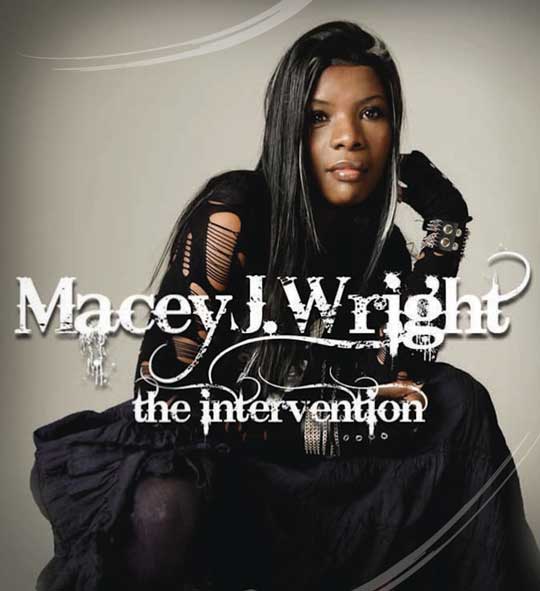Macy J. Wright: ‘I wanted to reach everybody. Even my attire on the album was to catch the eye of someone who was not the traditional gospel person, but who would listen to this CD.’Giving It Back To The Source
On her debut album, The Intervention, Macey J. Wright heeds her mother’s advice, and is duly rewarded
By Bob Marovich
Macey J. Wright's debut album, The Intervention, is a distillation of the artist's varied musical influences and life experiences, "starting from adoption, marriage, and having children.
"I wanted to make a CD that everybody could listen to," Wright said during a phone interview. "I wanted to reach everybody. Even my attire on the album was to catch the eye of someone who was not the traditional gospel person, but who would listen to this CD."
Born in Brooklyn, NY, Wright was adopted by a Pentecostal mother and Baptist father, "and Pentecostal won out," she said. As a young girl, she attended Holy Nations Pentecostal House of the Lord in Newburgh, NY.
Macey J. Wright, ‘Miracles On the Sea,’ from The Intervention: ‘one of the most breathtaking of inspirational songs this year…’Music came into her life when she was six or seven years old in the form of an old upright piano her uncle gave her mother. "I started banging on that piano," she said. "My first song was from the movie Ice Castles."
Wright admitted that as a youth, creating and listening to music were vehicles of escape because she struggled with the circumstance of being adopted. "It caused more pain than I should have let it." Ultimately, she recognized that if it weren't for her new parents, she may never have discovered her calling to music.
Although Wright took piano lessons formally as a college student, she started by teaching herself to play, serving as Holy Nations' pianist and its first music director. She organized a Sunshine Choir "that consisted of my nephews and my nieces, and some of the local children. I'd feed them pizza on Friday and say 'Now, you've got to come to church Sunday and sing the song I'm trying to teach you!'"
Wright's musical influences included Andrae Crouch, the Clark Sisters, Yolanda Adams, and Shirley Caesar. While studying at Five Towns College in Seaford, Long Island, where she earned an associates degree in jazz and voice, she expanded her musical spectrum to include Michael Jackson, Janet Jackson, Eartha Kitt, Manhattan Transfer, Spyro Gyra, and jazz violinist Jean-Luc Ponty. "An eclectic mix of all musicians. I just love music in every sense!"
Macey J. Wright, ‘Can You Use Me,’ from The InterventionShe entered the Army to earn money to continue her schooling, serving as a military police officer and performing patriotic music. While stationed in Germany for five years, she joined a local group called the Pyramid Band, which played primarily top 40 hits. "When I would sing top 40 songs in Germany, I was like, 'Oh Lord, if my mother heard this, she would die!'"
With a Pentecostal mother, "we weren't supposed to be listening to Prince or Janet or Michael. I remember playing Janet Jackson's Control on my record player in my room. When my mother heard it, she came in and cracked the record in half! I thought, 'Oh, you just destroyed musical genius!' but for her it was all about the sound of the music. She didn't understand that it was about the artists' musical genius, so she forbade it."
Still, it was her mother who persuaded her to rededicate her musical talent to the Lord. "She told me that God gave me this gift, and I should give it back to Him. She told me, 'If you give it back to Him, then He'll magnify it.' That was really inspirational for me."
Today, Wright is minister of music at Redeeming Love Family Church in Fayetteville, NC. The initial response to her album, The Intervention, and its first single, "Can You Use Me," has been positive. They can be heard in 39 cities thus far, she said. "The album is blessing the hearts of those who might not go into traditional gospel or the more contemporary gospel, but they are listening to this. I'm really excited about the feedback I'm receiving."
Wright is now preparing promotional appearances and hopes that another single from the album, "Miracles on the Sea," one of the most breathtaking of inspirational songs thus far this year, secures as healthy a following as "Can You Use Me."
"['Miracles on the Sea'] was captured on the first take and the only take," she said. "We didn't add anything to it: no bells, no violins, nothing. Afterwards, the producer, the engineer and I just sat in the studio, crying! The song says that when you are going through, God won't take away the obstacles. He will give you the strength to take you through them."
The most personal statement on The Intervention, however, is "7 x 70."
"I read in the Scriptures that when somebody does something to you, you have to forgive him seven times seventy. Multiplying it, that's 490 times! That's a lot of forgiveness! But the Word of God allows us to know that we can forgive. It is a catapult to other great things that happen because we let go of what someone may have done or said.
"It allows God to do what He wants to do in our life because we don't have all that junk holding us back."
For more information, go to http://www.maceywrightintervention2k10.com/
Founder/Publisher/Editor: David McGee
Contributing Editors: Billy Altman, Laura Fissinger, Christopher Hill, Derk Richardson
Logo Design: John Mendelsohn (www.johnmendelsohn.com)
Website Design: Kieran McGee (www.kieranmcgee.com)
Staff Photographers: Audrey Harrod (Louisville, KY; www.flickr.com/audreyharrod), Alicia Zappier (New York)
E-mail: thebluegrassspecial@gmail.com
Mailing Address: David McGee, 201 W. 85 St.—5B, New York, NY 10024



